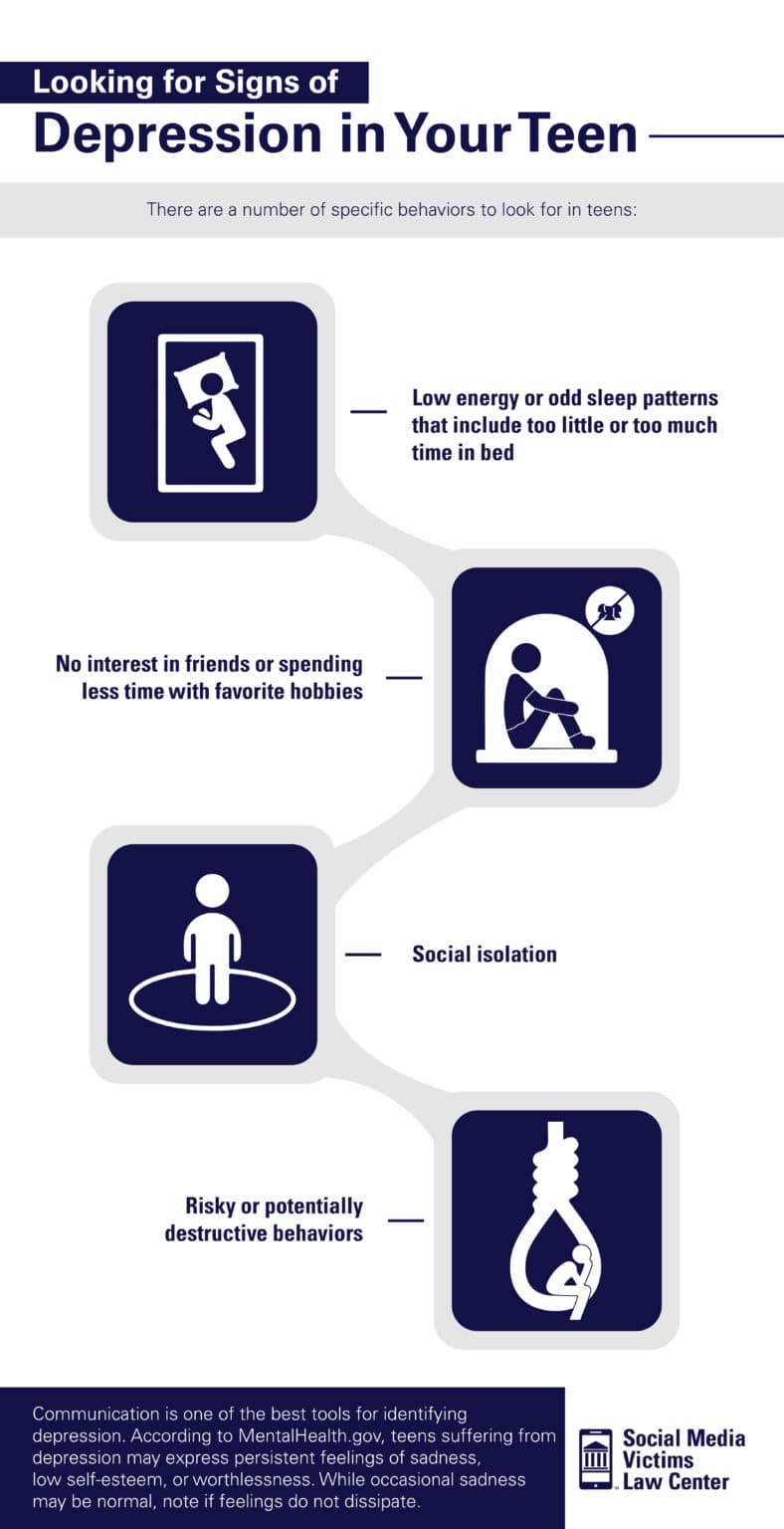Social Media and Depression
Depression is one of the most powerful, yet unseen illnesses in the United States. In recent decades, our society has become more aware of the impact depression may have on specific groups. Mental health researchers have examined the impact of depression on soldiers and physicians, among others. In many cases, the research considers factors like PTSD and burnout caused by the conditions of one’s career.


- Content last updated on:
- November 14, 2025
Written and edited by our team of expert legal content writers and reviewed and approved by

- Content last updated on:
- November 14, 2025
More recently, mental health experts have become increasingly concerned about the profound effect that social networks can have on depression in young people. A 2020 review in the International Journal of Adolescence and Youth examined time spent, investment, addiction, and activity related to social media. They found correlations between these four areas and depression, psychological distress, and anxiety. Other studies have examined the ability to predict a potential depression diagnosis by examining social media posts of the general public and among college students.
Parents, caregivers, and teachers may want more information on how social media can impact the impressionable minds of children and teenagers. Here are a few things to consider about the correlation between social media use and depression as well as potential strategies to mitigate or control any potential influence.

The Link Between Online Social Media and Networking Sites and Depression
The above research demonstrates correlations between depression diagnoses and the social media experience. However, the important question is whether social media actually causes depression? Is it possible that an otherwise mentally healthy person can develop depression symptoms following high social media use? Unfortunately, pinpointing the direct cause of depression in adolescents and younger adults has proven difficult.
If social media can cause depression, then the U.S. should have experienced higher levels of mental illness as social-media and smartphone use increased. In fact, a new research review by Abi-Jaoude et al. finds a number of troubling links over the past two decades. For example, social media can alter adolescents’ body image and social relationships. The effects of social media are especially pronounced in teenage girls. Online experiences like cyberbullying and the normalization of dangerous behaviors can further contribute to social isolation and negative emotions.
The risk of depression can also be enhanced by the lifestyle changes caused by the addictive effects of social media. Children and teens with heavy use of social media may not prioritize more important elements of a healthy lifestyle, such as exercise. Research has proven that exercise and high levels of physical activity are linked with a number of positive impacts on the brain in older adults. Harvard Medical School has also published several articles linking exercise to improvements in both memory and thinking abilities.
Sleep deprivation is another lifestyle issue that can be exacerbated by heavy social media use. A recent study published in BMJ Journals found that more than a third of the study participants spent greater than 3 hours a day on social media, and over a fifth used social media for at least five hours daily. Most importantly, these same users were more likely to report going to sleep later, waking up later, and being unable to return to sleep after a nighttime awakening.
Facebook and Instagram Knowingly Causing Harm to Teens
Perhaps one of the most troubling aspects of the links between social media and depression is the fact that Facebook and Instagram are well aware that their products harm teens. A Wall Street Journal article indicated that the company’s own internal studies revealed that 13% of British and 6% of U.S. teens who reported thinking about suicide traced the problem to Instagram. In addition, 32% of girls and 14% of boys indicated that Instagram magnified their feelings of negative body image.
Despite this reality, the company has consistently refused to take the matter seriously. Unfortunately, that means parents and caregivers ultimately bear the sole responsibility for keeping their kids out of harm during online social interaction.
Looking for Signs of Depression in Your Teen
Because of the scientific research-backed correlations between symptoms of depression and social media use, it falls upon parents and caregivers to identify the depressive symptoms. The U.S. National Institute of Mental Health offers some guidelines for identifying when it may be time to seek help for children or young adults. Generally speaking, you should pursue professional assistance when new behaviors persist longer than a few weeks and interfere with school, home, or social life. Thoughts of suicide and self-harm or threats of harm to others should be addressed with proper support.
There are also a number of specific behaviors to look for in teens:
- Low energy or odd sleep patterns that include too little or too much time in bed
- No interest in friends or spending less time with favorite hobbies
- Social isolation
- Risky or potentially destructive behaviors

Communication is one of the best tools for identifying depression. According to MentalHealth.gov, teens suffering from depression may express persistent feelings of sadness, low self-esteem, or worthlessness. While occasional sadness may be normal, note if feelings do not dissipate.
How to Help Your Teen: Studies Find That Limiting Social Media Reduces Depression
Raising a child can be an incredibly complicated matter, especially when it comes to mental health. Fortunately, limiting internet use and time on social media sites is a simple way to enhance the mental health of children and young adults. The results of a study by Shensa et al. linked certain social media use patterns with both anxiety and depression. However, is it possible to directly change these feelings by adjusting participation in social media sites?
Another study in the Journal of Social and Clinical Psychology reported findings that suggest there may be a causal link. This experiment focused on undergraduates at the University of Pennsylvania, separating the young-adult users into two clusters. The first group used social media accounts normally, while the second limited time on Facebook, Instagram, and Snapchat to ten minutes a day per platform. In a little over two weeks, they found that those who spent the least time on those platforms had “significant reductions in loneliness and depression.”
Based on this data, it is likely that mental health issues can be improved by limiting social media exposure.
Talking to Your Child About Social Media Time Limits
Controlling screen time may have been easier for earlier generations. In the modern era, young minds have a special relationship with the digital world. In fact, a new study by the Pew Research Center indicates that the majority of parents already believe their children spend too much time online. A whopping 86% of parents already limit screen time for children between 5 and 11.
A release by the Children’s Hospital of Los Angeles advises parents to begin conversations about social media use with “I” statements instead of using “you.” They also recommend mentioning changes in behavior and offering to talk about the causes. It is important to “check-in regularly” and “keep the lines of communication open.” Finally and perhaps most importantly, parents and caregivers must model the desired behavior.
Supporting Your Child Suffering From Depression
Children suffering from depression may be at risk for suicide or self-harm. Fortunately, there are things that can be done to improve the circumstances. For U.S. parents and caregivers, the National Institute of Mental Health’s “Find Help” page is a great place to start.
If you believe your child has already been harmed by the effects of social media, please contact us for a free consultation.
Frequently Asked Questions
For individuals and children who have been
We only handle cases on a contingent fee basis. This means that we are paid a portion of any recovery obtained in the case and you do not owe us any attorneys’ fees if the lawsuit does not result in a recovery.
Every case is unique. Our attorneys will work with your family to evaluate your potential case and help you evaluate whether filing a lawsuit or other legal proceeding is in your family’s best interest. Generally speaking, the types of cases we handle involve serious mental health effects, including attempted or completed suicide, eating disorders, inpatient mental health treatment, or sexual trafficking/exploitation that was caused by or contributed to through addictive or problematic social media use by teens and young adults.
We are a law firm based near Seattle, WA comprised of lawyers who have spent their entire careers representing victims who have been harmed by dangerous products. We are also parents. Shocked and troubled by the recent revelations about the harm caused to teens and young adults by social media platforms, which powerful technology companies have designed to be highly addictive, Social Media Victims Law Center was launched specifically to help families and children who have suffered serious mental harm or exploitation through social media use to obtain justice.
Contact Us Today
Related Pages
Client Testimonials
Is Your Child Addicted to Social Media?
You Are Not Alone.
We have helped hundreds of families just like yours whose children and teens were affected by social media addiction.
Explore Popular Topics

Addiction

Suicide

Eating Disorders

Anxiety

Bullying

Sexual Abuse

Body Image

